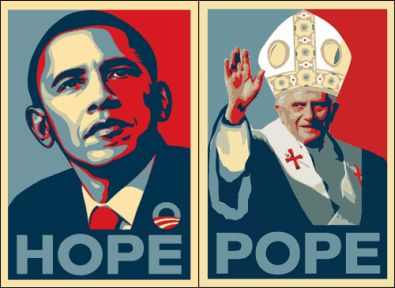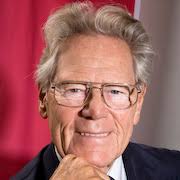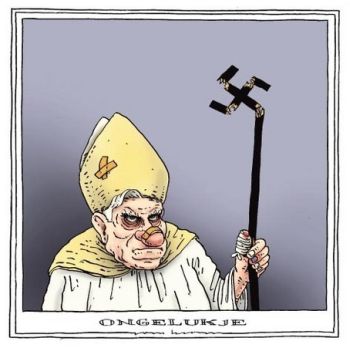
Admiration
for Barack Obama is such that even the
Catholic
Pope is being compared unfavorably to him.
Sueddeutsche Zeitung, Germany
'If Only Obama
Were Pope ...'
"While President Obama is capable of looking forward and
opening himself up to the people and the future, this Pope is primarily facing
backward, inspired by the ideals of the medieval Church, skeptical about the
Reformation and ambivalent about the rights and freedoms of the modern
age."
An External View By Hans Küng*

Translated
By Jonathan Lobsien
January
30, 2009
Germany - Sueddeutsche Zeitung - Original
Article (German)
In
a very brief period of time, President Barack Obama has succeeded in leading
the United States out of its depressing mood and has begun digging into the
backlog of overdue reforms, putting forth a credible vision of hope and setting
in motion what could be a strategic turning point for both the domestic and
foreign policies of that great land.
Things
are different in the Catholic Church. The mood is oppressive, the backlog of
reforms crippling. After nearly four years in office, many see Pope Benedict
XVI along the lines of George W. Bush. It’s no coincidence that the Pope
celebrated his 81st birthday last year at the White House. Both Bush and Ratzinger are inflexible on questions of birth control and
abortion, averse to any serious reforms, egomaniacal and without transparency
in their administration, and restrictive in interpreting the freedoms and rights
of the people.
NO MORE EXPECTATIONS
Just
like Bush, Pope Benedict is suffering from a growing loss of confidence. Many
Catholics expect nothing more from him. Worse still: By rescinding the excommunications
of four illegally ordained traditionalist bishops, including a notorious
Holocaust denier, all the misgivings that people felt when Ratzinger
was chosen have been confirmed.
The
Pope looks down on people who support the
reforms of the Second Vatican Council  ,
which affirmed the freedom of religion, reconciliation with Judaism, holding Islam in high
regard and holding a dialogue
with the other churches and other world religions - as well as reform of the liturgy.
,
which affirmed the freedom of religion, reconciliation with Judaism, holding Islam in high
regard and holding a dialogue
with the other churches and other world religions - as well as reform of the liturgy.
THE VATICAN AND THE HOLOCAUST DENIER
In
order to promote “reconciliation” with a small group of hard-line conservative
traditionalists, this Pope has risked losing the confidence of millions of
Catholics in all other countries who remain loyal to the Second Vatican
Council. That such a misstep comes from a German Pope has only exacerbated the
conflict. Retroactive apologies will do nothing to mend the shattered
porcelain.
But
a Pope would find it easier to change course than a President of the United
States. He has no Congress as a legislative hindrance and no judicial power
like the Supreme Court to deal with. He is the supreme head of government,
lawmaker and highest judge in the Church. He could overnight, if he wanted to,
allow contraception, allow priests to marry, permit the ordination of women,
and approve a sacramental alliance with the Protestant churches.

During the customary exchange of gifts on a visit to the
Vatican in June, 2007, President Bush gives the Pope a
walking stick hand-carved by a former homeless man
from Texas and covered with the Ten Commandments.
What
would a Pope do if he were to act in the spirit of Obama? He would first,
similarly to Obama, articulate that the Roman Catholic Church finds itself in a
deep crisis, and he would name the trouble spots: many communities without a
priest, a new generation staying away from the priesthood and the ruin of
pastoral structures that in many cases grew out of unpopular parish mergers
over the centuries.
Posted by
WORLDMEETS.US
Secondly,
he would declare a hopeful vision for the renewal of the Church, a revitalized
ecumenism [unity among Christian denominations], an understanding with the
Jews, Muslims and the other world religions, and a beneficial evaluation of
modern science. Third, he would surround himself with a very talented staff, no
yes-men, but rather independent personalities backed up by competent and
intrepid experts. Fourth, he would promptly decree the most urgent reform
measures (“executive orders”); and fifth, he would immediately initiate an
ecumenical council for the promotion of a change in direction.
WHAT A DEPRESSING CONTRAST
While
President Obama, with the approval of the entire world, is capable of looking
forward and opening himself up to the people and the future, this Pope is primarily
facing backward, inspired by the ideals of the medieval Church, skeptical about
the Reformation and ambivalent about the rights and freedoms of the modern age.

Bush Says to Pope: 'I
love God, I've read all of his books'
[Tribune de Genève, Switzerland]
While
President Obama cooperatively strives for new partners and allies, Pope Benedict,
like George W. Bush, is prejudiced by “friend or foe" thinking. He
alienates fellow evangelical Christians by not recognizing such groups as
churches, and talks with Muslims haven't gotten beyond empty phrases that are
called “dialogue.”
Posted by
WORLDMEETS.US
The
relationship with Judaism must be described as deeply unsettled. While
President Obama radiates hope, advocates public service and calls for a “new
era of accountability,” Pope Benedict is prejudiced by an agenda of fear and
prefers to limit the freedom of the people, in order to enforce an “era of
restoration.”
NO DREAD OF THE FUTURE
While
in Washington, President Obama aggressively cites the Constitution and the
great traditions of his country to justify bold reforms, Pope Benedict in Rome
restrictively construes the Vatican reform decrees of 1962 to 1965 [Second
Vatican Council] - in reverse: in the direction of the Restoration Council of
1870 [the First Vatican Council  ].
].

'MISHAP'
[Het Parool, The Netherlands]
But
since, in all likelihood, Pope Benedict will not become like Obama, for the
next term we need an episcopacy [church government] that will not cover
up the obvious problems of the Church, but rather openly name them and
energetically approach them on the level of the diocese [local churches];
secondly we need theologians who will work together actively on a vision for
the future of the Church, and who have no timidity about stating and writing
the truth; thirdly we need ministers who will struggle to prevent the constant
tendency to overload various parishes by over-centralization, and who will
boldly embrace their personal responsibility as pastors; fourth, we have a
particular need for women, without whom spiritual guidance would in many places
collapse, and who will self-consciously embrace opportunities to exercise
influence.
But can we really do this? Yes, we can.
*Hans Küng, 80,
is professor emeritus of ecumenical theology at the University Tübingen and president of the Foundation for a Global Ethic [Stiftung Weltethos]. In 1980 the Vatican 'allowed' his ecclesiastic teacher’s license to be
revoked  .
.
CLICK HERE FOR GERMAN
VERSION
[Posted by WORLDMEETS.US February 3,
10:09pm]